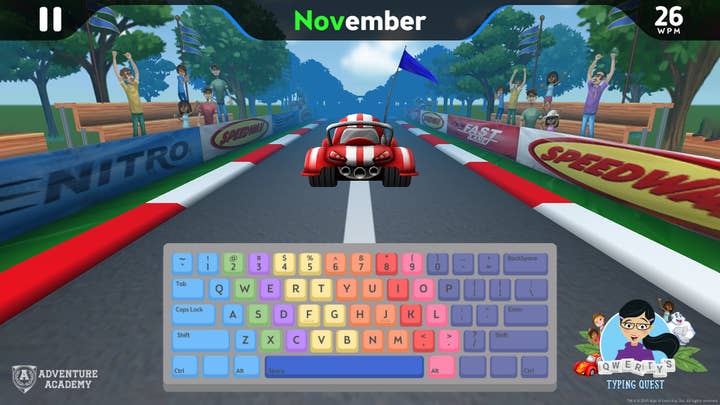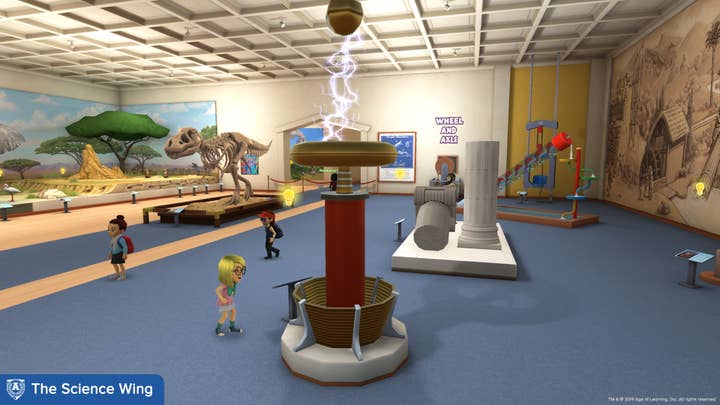Adventure Academy: The educational MMO made by WoW, LOTRO devs
US developer Age of Learnings talks us through Adventure Academy and its plans to teach kids through play
For decades, developers and academics have sought ways to use the interactivity of video games to help educate children. From console classics like Mario Is Missing (remember that?) to the plethora of mobile apps, there have always been efforts to combine playtime with learning.
Adventure Academy may be the most ambitious attempt yet. Developed over the past three years by Age of Learning, this is an MMO targeting elementary and middle-school students that challenges them to explore the titular institution and the grounds around it, engaging in quests and mini-games as they do.
There are thousands of "learning activities", as the developer calls them, which encompass a mix of mini-games, videos and interactive reading sessions. It's also cross-platform over desktops, laptops, smartphones and tablets, so kids can continue their adventure wherever they want.

"We think we've done something really unique and innovative, building this kind of big, ambitious massively multiplayer game," says president of production Alex Galvagni. "But ultimately this is an educational product."
The project was born out of the studio's previous hit ABC Mouse, a collection of educational games aimed at early childhood (kids aged two to eight) that has been hugely successful in the US, attracting tens of millions of players.
"We wanted to follow this up with a product for an audience that was a little bit older," says Galvagni. "What happens when they graduate from ABC Mouse and move on to grade and middle school? This is the product that addresses that."
More interesting, however, is the team's past experience before ABC Mouse. Galvagni was previously general manager of Lord of the Rings Online developer Turbine Studios, while executive producer Kevin Beardslee was one of the original developers on World of Warcraft. The studio is also staffed by hundreds of developers that previously worked on these and other MMOs, injecting authenticity into Adventure Academy's position in the genre.
"All the core elements of an MMO are in this game," says Beardlsee. "When I worked on WoW, we made [those elements] more accessible to people. In earlier games, quest givers didn't have a marker above their heads. So here we indicate, 'This is a quest-giver, they want to talk to you.'
"We're not trying to find whales, or do ultra monetisation. We're trying to get kids to learn how to be successful in their academic careers"
Alex Galvagni, Age of Learning
"There's a rich story around this world, its founding and all the creatures and inhabitants in this fantastic realm. Just like in modern MMOs, you're guided through the world with quests, peeling off layers and learning more and more about the world, venturing further out until you unlock new zones. These are things most MMOs do; you don't want to overload the player too much upon login, so a lot of those same theories are evident in this game as well."
Galvagni adds: "Another thing is it's just hard to build an MMO [without experience]. The technical, the visuals, the animations -- we're bringing all of those things together with our wonderful group of multiple hundred people who also have backgrounds in MMOs and this kind of deep, rich, persistent product."
Unlike the rest of the MMO market, Adventure Academy will not be free-to-play. Like ABC Mouse, this will be subscription-based, costing $9.99 per month, or less if you opt for an annual package. There will be no in-app purchases, no advertising -- none of the monetisation trappings that dog free-to-play games.
"For a year, that's less than the price of one tutoring session for a third grader," says Galvagni.
He continues: "We think it's a really good way to deliver an academic product. We're not trying to find whales, or do ultra monetisation. We're familiar with that business -- before I was at Turbine, I was at Glu. That's not the business we're in. We're trying to get a reasonable monthly subscription for kids to learn how to play, how to interact and how to be successful in their academic careers."

The learning activities have all been designed by a dedicated curriculum team, formed of around 40 experts in various subjects, including maths, science, English language, art and social studies.

Joel Kupperstein, SVP of curriculum management, tells us: "We did extensive research surveying people around the country... to design activities that get out the stuff that's most important for kids to be learning. The stuff they care most about, the stuff their teachers care most about, the stuff that they struggle with. Stuff like fractions -- what kid doesn't have trouble with fractions at elementary school?
"I think we've tapped into the fact that kids at this age still enjoy learning when it's presented in an engaging way, and we've learned a lot about the kind of agency kids require -- that's why it's an MMO. I come from an education background, not a gaming one, so to see the two things plug together makes so much sense to me."
Historically, attempts to make a game educational have actually detracted from the gameplay, but Galvagni is confident that the inclusion of all the systems players expect from MMOs will help make this much more engaging. Like many MMOs, Adventure Academy has leveling (with endgame content for those who reach the cap), a guild system, items for players to unlock, customisable avatars, housing for personalised spaces and, of course, a large world to explore.
"The education to some extent can be considered the grind, but even the educational activities are interactive, they're fun, they are not preachy," says Galvagni.
"We have a lot of systems similar to Fortnite. A lot of younger players can't complete that game's daily challenges, but here they can"
Kevin Beardslee, Age of Learning
Kupperstein adds: "Kids get tons of choice. That's one of the most important things. There's not a fixed path through the content that requires kids to do what we say, but there's lots of options. We use our questing and adventure maps to guide kids through topics, but fundamentally they have the choice of what they want to pursue. If they want to focus on science, fantastic. If they want to focus on reading, fine.
"We went to great lengths to integrate literacy experiences into all of those things. If you want to focus on science, you're doing it through all these deep reading experiences. But it's not a forced, marched path through the curriculum; it's something kids can explore on their own. And we know from research that kids work better when they work together, and an MMO is set up in a way that elucidates that from kids."
Adventure Academy is admirably ambitious, to be sure, but how can it hope to gain attention in an era when kids' gaming time is dedicated almost entirely to Fortnite and/or Minecraft? While Age of Learning will naturally be reaching out to the millions of children that 'graduate' from ABC Mouse as they grow too old for its activities, the draw of games from more established developers will be nigh on impossible to overcome.
"I don't think it's a case of them playing ours instead," says Galvagni. "People will continue to play Fortnite and other games on console. I think this is going to be a really fun, exciting experience that has educational components that people will really appreciate. Also, we expect that parents will appreciate this kind of safe, educational environment for kids and will ultimately be the ones buying subscriptions."
Beardslee adds: "We have a lot of systems similar to Fortnite. We have emotes, an outfit system and fully customisable avatars. Very shortly after launch, we'll have daily challenges. What we're getting back from younger players is that a lot of them can't complete those challenges in Fortnite -- they're hard -- but in here they can. Or if they don't have the V-Bucks to buy something in Fortnite, in this game they can earn the coins, they're capable of doing it all themselves. Some of the testimonials we've had back say that kids are loving it because they can accomplish their goals in this game."

Galvagni points out this is another reason it was important to go for a subscription, rather than free-to-play model: "Even things like daily quests, we're doing so that people can come back so they can learn. Unlike free-to-play games where they're trying to bring them back so they can monetise them. That is a totally different motivation behind monetisation. We're really focused on kids being successful."
Adventure Academy goes live today with its initial zones and quests, but more are already in development and will launch "as frequently as possible." In addition, Galvagni hopes to deliver multiple expansions per year, as well as raising the level cap for the Honor Society that players unlock when they reach the current maximum.
Meanwhile, Kupperstein's curriculum team will continue to keep the educational content relevant and up to date, planning for many years of lessons for its players.
"The curriculum content roadmap goes way out into the future," he says. "We're constantly thinking about how we broaden the content, go further up into ability levels, make sure we've got the right stuff for every kid to find what they need and what they want to pursue.
"We can constantly refresh stuff for history and social science, we can also keep an eye on what's interesting, what's trending, what's new. That way, we have an incredibly quick production team for our video content, so our roadmap can be as flexible as it is long."

